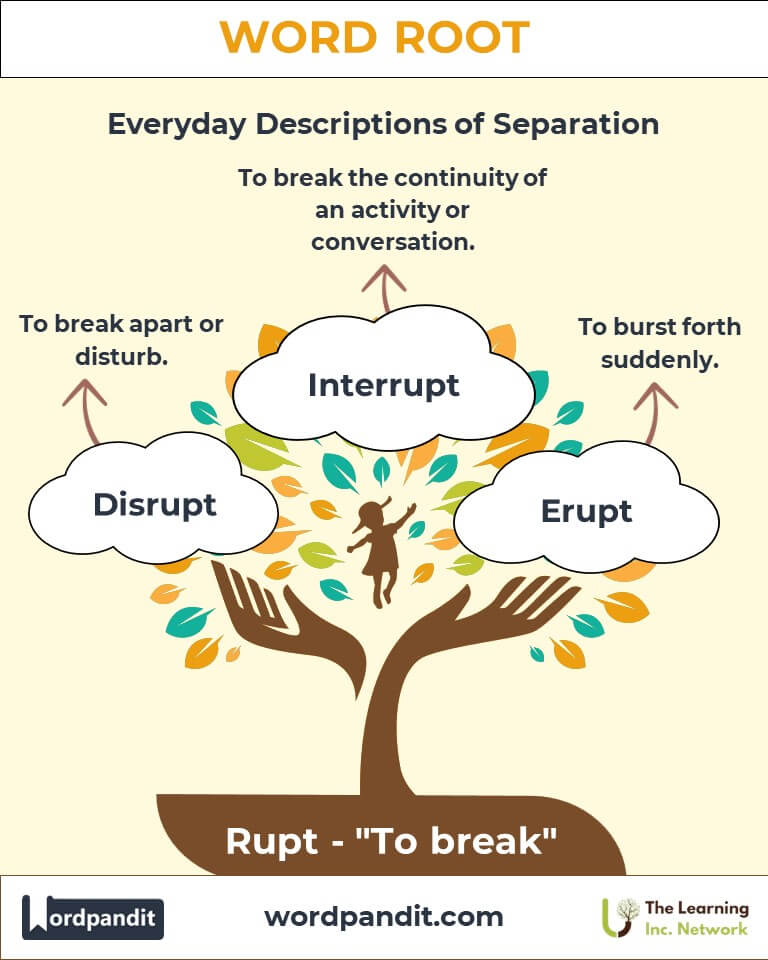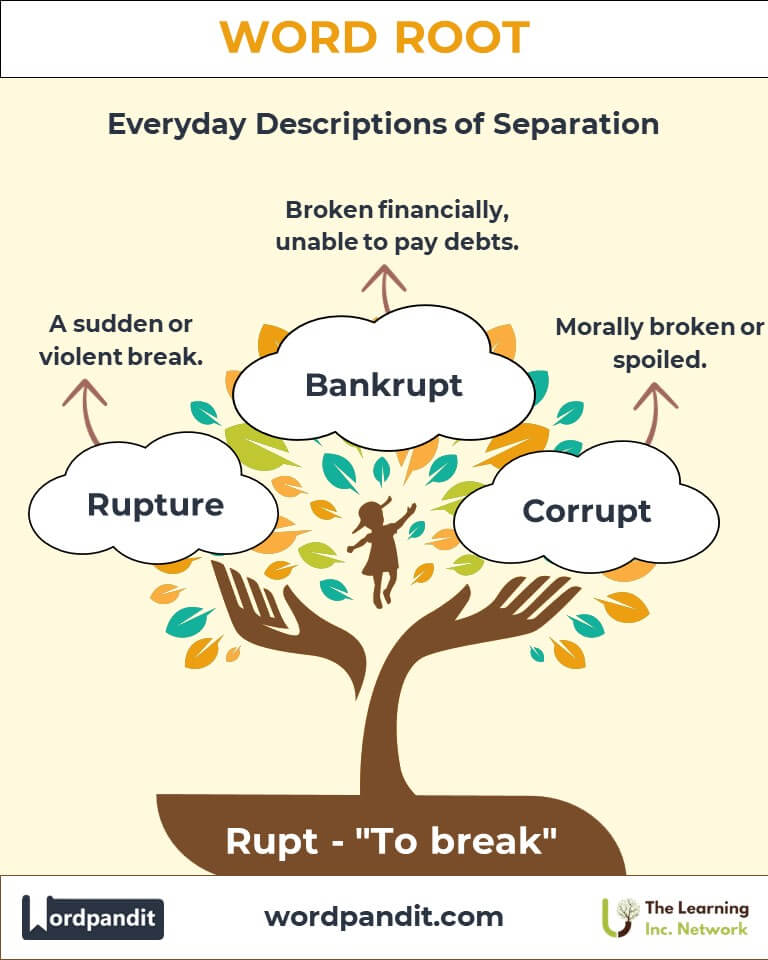Rupt: Breaking Barriers in Language and Meaning
Byline: Discover the dynamic root "rupt," derived from the Latin word rumpere, meaning "to break." Words like "rupture" and "interrupt" demonstrate how this root weaves the concept of breaking into everyday language, reflecting its significance in communication, technology, and even human emotion.

Table of Contents
- Introduction: The Power of "Rupt"
- Etymology and Historical Journey
- Mnemonic: Remembering "Rupt" with Ease
- Common Rupt-Related Words
- "Rupt" Through Time
- "Rupt" in Specialized Fields
- Illustrative Story: "Rupt" in Action
- Cultural Significance of the Root
- The "Rupt" Family Tree
- FAQs About the "Rupt" Word Root
- Test Your Knowledge: "Rupt" Word Root Quiz
- Conclusion: The Living Legacy of "Rupt"
1. Introduction: The Power of "Rupt"
What happens when something breaks—be it silence, a structure, or a rule? The root "rupt" captures this dynamic action, symbolizing disruption and transformation. From physical breaks (rupture) to interruptions in conversation, this root highlights moments of change that shape our lives and language.

2. Etymology and Historical Journey
The Latin root rumpere (to break) entered English through Old French and Latin, maintaining its sense of separation or fracture. Early use of "rupture" referred to physical breaks, while terms like "interrupt" expanded the root's metaphorical applications in communication and time.
3. Mnemonic: Remembering "Rupt" with Ease
Imagine a balloon suddenly bursting, with the sound "rupt" echoing through the air—a vivid break that’s hard to ignore!
Mnemonic Device: "Rupt erupts into every break, from silence to barriers."
4. Common Rupt-Related Words
-
Rupture (RUP-chur): A sudden or violent break.
Example: The earthquake caused a rupture in the dam, leading to flooding. -
Interrupt (in-ter-RUPT): To break the continuity of an activity or conversation.
Example: She apologized for interrupting the meeting but had an urgent message to deliver. -
Disrupt (dis-RUPT): To break apart or disturb.
Example: The protest disrupted traffic for hours. -
Erupt (ee-RUPT): To burst forth suddenly.
Example: The volcano erupted with a fiery explosion of lava. -
Bankrupt (BANK-rupt): Broken financially, unable to pay debts.
Example: The company declared bankruptcy after months of declining sales.
5. "Rupt" Through Time
Corruption: Originally meant "broken" or "spoiled," now refers to moral decay.
Interrupt: From Latin interrumpere, meaning "to break between," evolved into its current use in discourse.
6. "Rupt" in Specialized Fields
- Medicine: Rupture: Refers to the tearing of tissue or organs, e.g., ruptured appendix.
- Technology: Disruption: Highlights breakthroughs that challenge traditional methods (e.g., disruptive innovation).
- Finance: Bankrupt: Indicates financial failure, with legal and economic implications.
7. Illustrative Story: "Rupt" in Action
Amid a heated courtroom debate, a sudden interruption shattered the proceedings: the defense lawyer erupted with new evidence that threatened to disrupt the prosecution’s case. This pivotal moment created a rupture in the trial’s rhythm, forcing both sides to adapt.
8. Cultural Significance of the Root
"Rupt" symbolizes transformation across cultures. From disruptive technologies that reshape industries to erupting volcanoes revered or feared in mythology, this root underscores the power of breaking norms, boundaries, or expectations.

9. The "Rupt" Family Tree
- Fract (Latin: "break"):
- Fracture: A crack or break.
- Fraction: A part of a whole.
- Frag (Latin: "break into pieces"):
- Fragile: Easily broken.
- Fragment: A broken piece.

10. FAQs About "Rupt"
Q: What does "rupt" mean?
A: "Rupt" comes from the Latin root rumpere, meaning "to break." This root appears in numerous English words, where it signifies physical, metaphorical, or systemic breaks, such as in "rupture" (a break or tear) and "interrupt" (a break in continuity).
Q: How does "rupture" differ from "interrupt"?
A: Rupture: Refers to a complete or significant break, often physical (e.g., a ruptured pipe) or metaphorical (e.g., a rupture in relations).
Interrupt: Focuses on breaking into an ongoing process or activity, like pausing a conversation or interfering with a flow (e.g., interrupting a meeting).
Q: Is disruption positive or negative?
A: "Disruption" can be both:
Positive disruption: In innovation, it often refers to groundbreaking changes, like disruptive technologies (e.g., smartphones disrupting communication).
Negative disruption: In daily life, it can mean disturbances or interruptions that create inconvenience (e.g., a train delay disrupting a schedule).
Q: Why is "bankrupt" related to "rupt"?
A: "Bankrupt" comes from the Italian phrase banca rotta, meaning "broken bench," which referred to merchants whose trading benches were literally broken to signify financial failure. Over time, it evolved to mean someone who is financially "broken" and unable to pay debts.
Q: How does "corrupt" connect to "rupt"?
A: "Corrupt" originally meant "broken" or "spoiled" and was applied to people or systems morally compromised or tainted. For example, a corrupt official is someone whose ethical principles are broken.
Q: What is "erupt," and how is it used?
A: "Erupt" means to burst forth suddenly, typically with force. It's often used in contexts like:
Volcanoes: "The volcano erupted with lava and ash."
Emotions: "She erupted with anger after hearing the news."
Q: How does "disrupt" apply in technology?
A: In the tech world, "disrupt" describes a significant innovation that transforms or replaces established systems. For instance, online streaming services disrupted traditional cable TV by offering on-demand content.
Q: Can "rupt" be part of medical terms?
A: Yes, in medicine, "rupture" refers to the breaking or tearing of tissues or organs. For example, a "ruptured appendix" describes a critical condition where the appendix bursts.
Q: Why is "rupt" important in language?
A: The root "rupt" is versatile and conveys the idea of breaking or interrupting in many forms, making it essential for describing events, changes, and disruptions in both literal and figurative senses.
11. Test Your Knowledge: "Rupt" Mastery Quiz
1. What does "rupt" mean?
2. Which word means "to burst forth suddenly"?
3. What does "interrupt" mean?
4. What does "disruptive" mean in technology?
5. Why is "bankrupt" linked to "rupt"?
12. Conclusion: The Living Legacy of "Rupt"
The root "rupt" reveals the profound impact of breaking—whether physical, metaphorical, or systemic. From disruptions that spark innovation to ruptures that demand attention, this versatile root reminds us that breaking can lead to transformation, growth, and discovery. How will "rupt" inspire you to embrace change?














